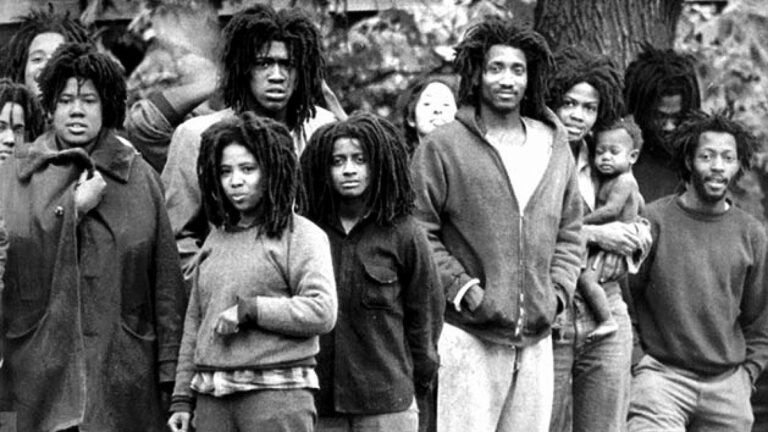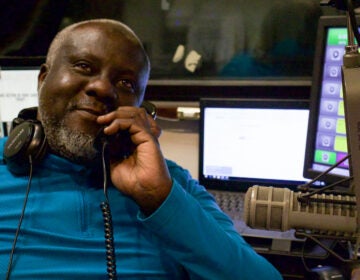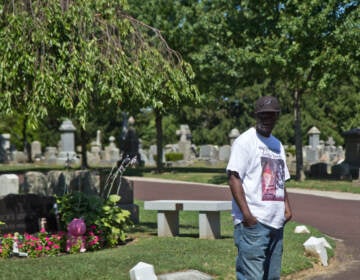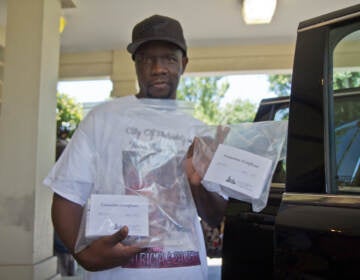35 years after MOVE bombing, the path to reconciliation is still unclear
For those affected by the bombing, including MOVE members, neighbors, political leaders and city residents, there is still no clear path to healing.

MOVE family (Courtesy of On a MOVE)
Wednesday marked 35 years since the city of Philadelphia dropped a bomb on the home of a radical Black liberation group called MOVE, killing 11 men, women and children, and let the ensuing fire destroy 61 homes in the neighborhood.
For those affected by the bombing, including MOVE members, neighbors, political leaders and city residents, there is still no clear path to healing.
“This whole thing hasn’t been easy on the MOVE family and it’s not over,” Mike Africa Jr. said on radio station WURD during a day of special programming to mark the anniversary. “This has been a day like all the other 34 May 13ths … another reminder that looms over our heads that our family was murdered.”
Africa was six years old when police bombed the MOVE home on Osage Avenue in the Cobbs Creek section of West Philadelphia on May 13, 1985.
Still, even after 35 years, the process of reconciliation and seeking justice for those who were wronged is complex, as politicians and callers to WURD laid out throughout the day.
Wilson Goode Sr., Philadelphia’s mayor at the time who gave permission to drop the bomb, is pushing for a renewed apology from current and former city leaders.
Goode wrote an op-ed piece in The Guardian earlier this week asking the city to join him in formally apologizing to MOVE members, neighbors and residents.
“I believe that the City Council members and the mayors and other people who hold these positions should not be reluctant in apologizing, even if it did not happen on their watch,” Goode said on WURD. “They should know that the most important thing you can do in running a city is to bring about healing and bring about people understanding one another in the city.”
“There is no way possible to get justice,” Africa told WURD hosts after Goode made his statement. Although Africa said freeing former Black Panther member Mumia Abu-Jamal would be a start. Abu-Jamal has been in prison since he was convicted in 1981 of killing Philadelphia Police Officer Daniel Faulkner. He spent decades on death row before his sentence was reduced to life in prison. Abu-Jamal has maintained his innocence and is pursuing an appeal.
Reconciliation is complicated by the fact that tension between MOVE and authorities went back years before the bombing.
MOVE often clashed with city police and with neighbors, who complained about how the group lived out its back-to-nature lifestyle. The group, which ate raw foods and took on the last name Africa, kept several dozen dogs. Neighbors complained of the smell of feces, rats, and of potential neglect, as the children were not sent to school and wore few clothes, even in the winter.
In 1978, police tried to evict MOVE members from a home in Powelton Village over more than a years’ worth of neighbor complaints. Authorities came armed with water hoses and tear gas. Police Officer James Ramp was fatally shot in the altercation — who shot him remains a topic of debate — and nine MOVE members received lengthy sentences for murder.
Philadelphia’s district attorney at the time was Ed Rendell. He recently told The Philadelphia Inquirer that he regrets pursuing harsh sentences for some MOVE members who weren’t in the organization’s leadership.
As of February, seven of the nine have been released on parole — for which MOVE advocated for a long time — while two others died in prison.
‘Wrong is wrong’
The bombing of MOVE’s Cobbs Creek home is seen by many as the most egregious example of violent policing, and a gross attack on Philadelphia’s Black residents, under the direction of the city’s first Black mayor.
Some Philly residents who called in to WURD said the city has a debt to pay to MOVE and all those whose homes were ruined when the city let the fire spread — and then shoddily rebuilt many of those homes. The city’s Redevelopment Authority is close to finishing a four-year process of rehabbing the homes again, many of which have already sold.
Some callers said reparations are due.
“They should get free medical care, they should be taken care of for the rest of their life,” said one caller from South Philly. “I don’t care who it was. Wrong is wrong.”
Though current Mayor Jim Kenney has no plans to answer Goode’s call for a formal apology, the idea has earned the backing of at least nine City Council members, who also want to make May 13 an annual day of remembrance. They plan to introduce a resolution later this year once the COVID-19 crisis has waned.
“I think that’s the type of unity that this event and tragedy deserves,” said City Council member Janie Gauthier, who represents the West Philly district where the bombing took place. “To have all of our city officials standing together, recognizing the wrong that was committed and committing to reconciliation.”
Speaking on WURD, Gauthier said she would want to bring the resolution to the public in an effort to hear how people were impacted.
Until then, Wednesday was a grim anniversary that marked another year of little movement toward healing.
WURD listeners shared their recollections of watching the fire burn from their television screens and in the early evening hours, a bell rang as Mike Africa Jr. read over the air the name of every person who died on May 13, 1985.
“Frank Africa… the most loyal man that I’ve ever heard of … Raymond Africa … Raymond was an extremely gifted handyman … Teresa Africa… Teresa was a light-skinned sister that had a lot of freckles on her face and her face looked like a ripened banana… She was so pretty.”
Africa also took a moment to remember how Rhonda Africa was the person who took care of him after his mother, one of the MOVE nine, gave birth to him in prison.
Correction: This story has been updated to reflect that Faulkner was killed in 1981.
WHYY is your source for fact-based, in-depth journalism and information. As a nonprofit organization, we rely on financial support from readers like you. Please give today.





